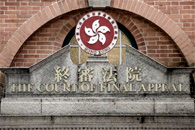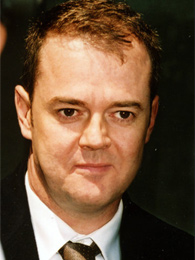Identified in the media only as W, the 30-something-year-old transgender woman took her case to the Court of Final Appeal after a lower court ruled against her in 2010. In 2009, Hong Kong’s Registrar of Marriages ruled that she could not marry her boyfriend because her birth certificate – which could not be changed under Hong Kong law – says that she is still a man despite having undergone sex reassignment surgery in 2008. Although she had a valid Hong Kong ID card showing that she was female, her birth certificate still classed her as male and was thus refused by the marriage registry.


Today, the Court of Final Appeal, ruling 4-1, found that the Basic Law and the Bill of Rights protected the right to marry.
"The right to marry guaranteed by our constitution extends to the right of a post-operative transsexual to marry in the reassigned capacity," the ruling, co-written by Chief Justice Geoffrey Ma and Permanent Judge Robert Ribeiro, said, according to a RTHK news report.
"In present-day multi-cultural Hong Kong where people profess many different religious faiths or none at all... procreation is no longer (if it ever was) regarded as essential to marriage," it added.
The ruling added that references to "woman" and "female" in Hong Kong's marriage law should include post-operative male to female transsexuals.
According to the South China Morning Post, the judgment states that whether a consensus regarding a transsexual’s right to marry exists among the people of Hong Kong is not a relevant consideration, because "(r)eliance on the absence of a majority consensus as a reason for rejecting a minority’s claim is inimical in principle to fundamental rights."
"We think it would be quite wrong to exclude such a transsexual person from the right to marry in her acquired gender by characterising her as a 'pseudo-type of woman,'" said the judgment.
The RTHK report further noted that the court said it would not implement the judgement for the next 12 months, to allow the government time to consider amending the law.
Permanent Judge Patrick Chan, the sole judge who opposed the ruling, was quoted as saying that including post-operative transsexuals in the definition of "man" and "woman" was "a radical change of the traditional concept of marriage".
"There is no evidence that the social attitudes in Hong Kong towards the traditional concept of marriage and the marriage institution have fundamentally altered," he said, adding that changes should only be made after "wide public consultation".
Michael Vidler, W’s lawyer, has called it a "landmark decision".
The decision brings the SAR in line with China and its Asian neighbours including Singapore, South Korea and Taiwan, where transgender people are allowed to marry (opposite sex partners) in their new gender.
Excerpts from the judgement (Click here to download judgement in full):
Need for comprehensive review
194 I am mindful of the problems facing transsexuals. If their reassigned gender is not recognized, this may cause them great distress. The Government is already prepared to fund the treatment and surgery of transsexuals and to issue new identity cards for those who have acquired a new gender. There is no logical reason why full recognition should not be extended to enable them to marry in their reassigned gender.
Protection of minorities
219 The Registrar of Marriages also raises the question of societal consensus in Hong Kong, saying that there is no evidence before the Court of any such consensus in favour of a post-operative transsexual marrying in the reassigned capacity. That is so, but nor is there any evidence of any such consensus against such a course. On a matter like this, it is doubtful that gathering and presenting reliable evidence of any societal consensus one way or the other would be at all easy.
220 Moreover, it is to be borne in mind that the present exercise is not to be confused with developing the law to meet new expectations. What is involved is a constitutionally guaranteed human right. One of the functions – perhaps by far the most important one – of constitutionally guaranteed human rights is to protect minorities. Why is there any need to guarantee a right to marry? After all, no society is likely to put impediments in the way of the majority entering into marriages as they like. The greatest and most urgent need for constitutional protection is apt to be found among those who form a minority, especially a misunderstood minority.
Right to marry in the reassigned capacity
224 Neither the appellant W, the respondent the Registrar of Marriages nor the intervener the International Commission of Jurists has addressed us on the question of same-sex marriage. I proceed in this case on the footing that the right to marry guaranteed by our constitution is a right to marry a person of the opposite sex. Such a right is undoubtedly a human right. To say that it has no application to post-operative transsexuals is to deny their humanity. So it does apply to them. In what way? To say that what it guarantees is a right to marry in the pre-reassignment capacity would run counter to the purpose of sex reassignment surgery as a treatment for transsexualism. It is inconceivable that a human right would operate in such an inhumane way. What is left? Quite simply and obviously, the right to marry in the reassigned capacity.
Transsexual Marriage in Hong Kong from Varsity CUHK on Vimeo.











 Printable Version
Printable Version

















Reader's Comments
On a related note, it makes me wonder how Singapore can view transsexualism, transsexual marriage rights as being inherently different to homosexuality and homosexual rights, marriage or otherwise. Contradictions. So human.
Please log in to use this feature.